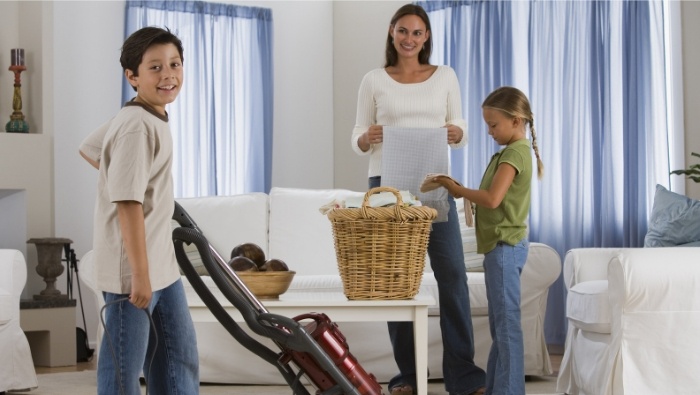Getting Kids To Complete Chores
by Gary Foreman

Are you tired of arguing with your kids about doing their part around the house? Taking a consistent, affirmative approach is key in getting kids to complete chores!
When you were little, doing chores was a part of growing up. And you think it should be that way for your kids, too. But getting them to complete household chores isn’t always easy.
So we contacted Jill Davis to help us. Jill is the owner of Upstairs Downstairs Cleaning Service in the suburban Chicago area.
Q. Why is it important for parents to get their kids to complete chores around the house?
Jill Davis: As a working mom of four teenagers, the only way to survive is to divide the work among the family. The benefits are many for having children help out around the house. And chores can build a closer relationship within the family.
Children working together and joking around with each other, older children being “the coach,” teaching younger children how to do chores, and younger children trying to do as much as their older siblings. There will always be comparisons about how much each child contributes, but in the long run, the goal is to teach each child responsibility and to be proud of what they can accomplish.
Q. At what age should children be expected to start helping around the house?
Jill Davis: Children can start helping around the house at a very young age. At as young as two years old, they can start by putting their toys back when done and putting dirty laundry in the hamper. They can slowly work up to helping with setting/clearing the table, dusting small tables, and vacuuming their own room.
If expectations are set early in life that everyone needs to help out, then it is easier to continue these expectations during the teenage years.
Sign Up for Savings
Subscribe to get money-saving content by email that can help you stretch your dollars further.
Twice each week, you'll receive articles and tips that can help you free up and keep more of your hard-earned money, even on the tightest of budgets.
We respect your privacy. Unsubscribe at any time.
Q. Are kids more motivated by duty or rewards?
Jill Davis: My belief is that children are motivated by duty. They should learn that if everyone does some of the work, there is more time for everyone to enjoy. Furthermore, sometimes rewards are in order, but chores around the house should not have a monetary amount set to them. Children should expect to help out around the house daily by making their bed and putting their own dishes in the dishwasher along with other tasks that should be done throughout the week.
Q. Some families use chore charts. What makes them effective?
Jill Davis: I do like chore charts. Kids can read the list and know what is expected. Children do not like to be told what to do on a daily basis. A list or chart works best. They can see all the expectations for the week and plan accordingly without parents nagging them. Changing the jobs over time will help keep them motivated.
As teens become busier with their own hectic schedules, chores can be negotiated. You will be surprised the ideas they come up with if you let them sign up for the chores they prefer.
Even at a younger age, you can show them a list of tasks and ask if they’d like to learn any task.
Also, include parents on the job charts as well. Children will notice all the work you do around the house that they may not normally notice.
Start Teaching Your Children the Importance of Saving
Compare savings and money market account rates and open an account for them today.
Q. How old do children need to be before they can handle cleaning supplies needed to do bathrooms and showers?
Jill Davis: Good question. It depends on the child, but I would recommend after the age of 10. They can better understand the safety issues with some cleaning chemicals. However, these tasks could be included on the job chart for the adults with the child as an assistant.
Q. What consequences should there be if a child doesn’t do their chores or does them badly?
Jill Davis: Don’t be too critical if the job is done poorly. Show the child what is wrong and the correct way to clean it for the next time. But do not discourage their efforts. Praise the work they do. Children will not be perfect at cleaning, but in the long run, they will be better off knowing how to clean and be proud of their work.
And if they decide not to do their chores? Privileges are the best recourse. If everything is not done, it is OK to negotiate a time frame for everything to be completed. They will learn that if the jobs are done on time, they will not need to go through the negotiation process.
Q. Why is it important to teach a child to be responsible in handling family chores?
Jill Davis: It is important that children have regular chores to do. Chores teach children that as part of a family, everyone needs to share in the workload. Also, chores can teach children responsibility which in turn will teach children to become responsible adults.
Can you get your kids to complete household chores? Taking a consistent, affirmative approach might be just what you need to get those chores complete!
Reviewed March 2022
About the Author
Gary Foreman is the former owner and editor of The Dollar Stretcher. He's the author of How to Conquer Debt No Matter How Much You Have and has been featured in MSN Money, Yahoo Finance, Fox Business, The Nightly Business Report, US News Money, Credit.com and CreditCards.com.
Wouldn't you like to be a Stretcher too?
Subscribe to get our money-saving content twice per week by email and start living better for less.
We respect your privacy. Unsubscribe at any time.
Popular Articles
- 7 Habits of Highly Frugal People
- 5 Simple Budget Cuts That Can Save $200 a Month
- How to Track Down Unclaimed Funds Owed You
- 32 Ways to Save Money on Your Utility Bills
- Do You Need Credit Life Insurance When Buying a New Car?
- How to Maximize Profits When Selling Online
- Staying Motivated to Continue Digging Yourself Out of Debt
On After50Finances.com
- 9 Things You Need to Do Before You Retire
- You Didn’t Save Enough for Retirement and You’re 55+
- When Empty Nesters Reorganize and Declutter Their Home
- Reinventing Your Career in Your 50s or 60s
- What Mature Homeowners Should Know about Reverse Mortgages
- 2 Reasons to Collect Social Security Benefits As Soon As Possible


